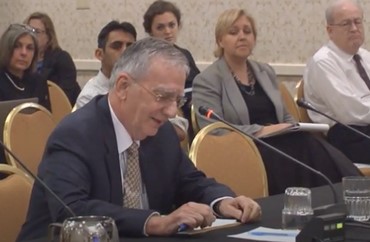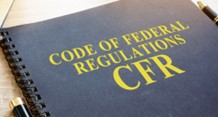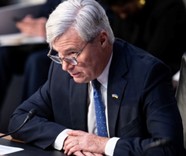 Atty William Sumner Scott, presentation to NACIQI public hearing in 2016, Photo:YouTube
Atty William Sumner Scott, presentation to NACIQI public hearing in 2016, Photo:YouTube
by Mary W Maxwell, LLB
Six years ago, William Sumner Scott addressed a committee of the US Department of Education concerning the way in which the American Bar Association (ABA) controls the accreditation of law schools — something he opposes. The opening words of his testimony to this committee were: “The ABA is one of the gatekeepers of forced ignorance in the United States.” He also said:
“What better energizer for malfeasance could there be than awareness that forces at the top are dedicated to maintaining weaponized prosecutions against those lawyers who dare challenge an official Government narrative?”
Talk about pith! I have now interviewed him about this.
Maxwell: In this photo you are speaking to a committee?
Scott: Yes. It’s called NACIQI, an odd name for an odd thing, the National Advisory Committee on Institutional Quality and Integrity. It provides expert advice to the Secretary of the US Department of Education.
Maxwell: Stop right there! Congress cannot legislate anything about education! Article I sec 8 of the US Constitution enumerates every area in which the US Government can make law, and Education is definitely not listed or even mentioned.
Scott: Nevertheless, Congress, with the approval of President Johnson, did so in 1965. They passed the Higher Education Act and no one stopped them.
Maxwell: The late wonderful Charlotte Iserbyt and the late wonderful John Gatto tried hard to fight this horror.
Scott: I am trying, too. But my efforts are focused on the quality of education in law schools and the actions of the US Government and the ABA in that regard.
Maxwell: All right let’s get back to National Advisory Committee on Institutional Quality and Integrity (NACIQI). I’ll pronounce it Nakiki.
Scott: It provides recommendations regarding accrediting agencies that monitor the academic quality of postsecondary institutions.”
Maxwell: I think I’m going to be sick. Government monitoring academic quality!
Scott: The authority for the Secretary to seek recommendations is contained in The Higher Education Act (HEW) of 1985. That Act provided it was to be reviewed by the US Congress every five years.
Maxwell: So the last one was 2020.
Scott: Actually, no reviews were conducted until 2008. At that point HEW was revised to prevent removal of the ABA as the accreditation agency for US law schools. And, it has not been reviewed again since 2008. It has been running on a series of temporary extensions through today.
Maxwell: As you know, I attended law school in Australia. I am not clear on who controls the curriculum in Australian Law Schools, but you have said that in the US it’s all in the hands of the ABA.
Scott: Not all, but the ABA does have sufficient power to prevent a reform of law school curriculum.
Maxwell: How do they have that power? You have told me that Congress imbued the Secretary of Education with power to delegate the accreditation of any law school to a committee. What do you mean by accreditation?
Scott: I will read to you from section 602.1 of Title 34 in the CFR.
Maxwell: CFR — Council on Foreign Relations?
Scott: No, the code of Federal regulations.

The CFR, Photo: nonprofitlawblog.com
Maxwell: Sock it to me.
Scott: It says:
“(a) The Secretary recognizes accrediting agencies to ensure that these agencies are, for the purposes of the Higher Education Act … reliable authorities regarding the quality of education or training offered by the institutions …”
Maxwell: Oh-oh. I bet you are going to tell me that each accreditation agency is a private organization.
Scott: I wasn’t going to tell you about all of the agencies because my knowledge extends only to the ABA. The ABA is a 501(c)(6) tax-exempt business league.
Maxwell: All right. Now I ask you, what if I open a new law school and it does not win accreditation. Will someone come out and shut down the school?
Scott: No, but presumably you would have a hard time recruiting students. According to section 602.10 of the CFR,
“Accreditation is a required element in enabling at least one of those entities … to participate in … Federal programs.”
Maxwell: Money makes the world go around. OK, I get it. But say I’m a billionaire and don’t need federal assistance to build my law school or for the students to get loans for tuition. Will the student flock to the gates?
Scott: Most states require law schools to be accredited by the ABA for admission to the test to be qualified to practice law in that state. Most law schools want to be accredited. Those that are not either are too new to be fully qualified or they have a procedure or teaching method that runs afoul of ABA standards. Most students will choose to attend an ABA accredited school.
Maxwell: Then please explain how the HEA (Higher Education Act of 1965) is really the voice of the ABA.
Scott: Who, but the ABA, would have pressured Congress to pass a law whose main purpose is to prevent, if I may call it, “The Mary Maxwell School of Law”? The ABA feels a need to turn out classes of law graduates every year who meekly accept what law practice is like in this country. Graduates of the MM School would not be meek.
Maxwell: You can say that again. MM grads would believe in justice. They would ‘call out’ a judge making, say, an unconstitutional ruling.
Scott: Let’s discuss judges. This may seem to be a different topic from control of law school accreditation but, no, it all runs together. Part of the student’s training in meekness has to do with showing respect in the courtroom. If a judge does something unworthy of respect, the graduate “knows better” than to make a fuss. In other areas of his life, he may make a racket of a fuss, but here his lips are sealed.
Maxwell: I would teach my student not to say “Yes, Sir, yes, Sir, three bags full, Your Honor.”
Scott: It’s a matter of how lawyers get disciplined. In their mature years they may decide to speak out against a judge. If so, they will get sanction or disbarred. Most state lawyer regulation mechanisms have a procedure for striking a lawyer off the rolls of those eligible to practice.
Maxwell: Allow me to say, William, that I have only just learned, in my dotage, the mechanics of de-registering a physician (and only in one state of Australia, New South Wales) — thanks to the sleuthing of a doctor named Russell Pridgeon. It seems that a private entity, the New South Wales Medical Council, has the power to determine a doctor’s worthiness to practice. How does this work for lawyers in, say, Florida?
Scott: Under the guise that the control of the admission to practice and rules of discipline of lawyers is determined by each of the 50 states, the ABA maintains control of those functions by the publication of uniform admission tests and disciplinary rules.
Maxwell: Please give me a sample of a disciplinary rule.
Scott: Since you asked about Florida, I’ll take one from their rules, but in general they are derived from a Model that the ABA has provided. The Florida Supreme Court has adopted Florida Bar Rules Chapter 4, called Rules of Professional Conduct. I will read from the introduction published by The Florida Bar on Internet:
“Failure to comply with an obligation or prohibition imposed by a rule is a basis for invoking the disciplinary process.”
Maxwell: Now please find a rule that says “If any member of the Bar sees an act in court that amounts to a felony, but fails to report it, he shall be referred for prosecution for the crime of misprision.”
Scott: The Florida Bar has such a rule. It is enforced against private lawyers but rarely, if ever, against judges.
Maxwell: Wow. I was kidding. I never thought there would be such a rule. Good old misprision.
Scott: I am aware that you are a fan of Sir William Blackstone’s Commentaries on the Laws of England.
Maxwell: Yes. Anything with a Blackstonian flavor makes me feel all happy and fuzzy. But then, you are no slouch in that department — “crimes against justice.” I repeat your opening remark at the 2016 hearing: “The ABA is one of the gatekeepers of forced ignorance in the United States.”
Scott: Thank you, but I wasn’t thinking that the ABA’s control of law schools makes law students unaware of Blackstone and our great heritage of English law. I meant, in the nitty gritty, the ABA forces ignorance about such things as Ruby Ridge, the Oklahoma City bombing, and 9/11.
Maxwell: The family at Ruby Ridge, the Weavers, ultimately got compensation for the FBI killing of Randy’s wife Vicki.

Vicki Weaver as seen from a US Marshals Service surveillance position (Wikipedia)
Scott: And there you see the triumph of law. But that was many years after wrong court actions against Randy. I maintain that the murders of JFK, RFK, MLK, 9- 11, and so forth have made it progressively obvious that the U. S. Justice system fails to protect the public from harm. It almost completely forbids any mention of wrongdoing by government.
Maxwell: I must congratulate you for the sharp case you made at that hearing, as seen in the video. You said:
“On September 11, 2001… the World Trade Center buildings came down at free fall speed…. Newton’s Second Law of Motion requires extreme force to do that. The only way to provide sufficient force is by the use of explosives…. However, the official U.S. Government 9/11 Commission report asserts that no explosives were used. The American Bar Association is an integral part of the higher education system that enforces the acceptance of the official 9/11 Commission report of no explosives. As a consequence of ABA control, the US legal system teaches that Newton’s Second Law of Motion does not apply to the destruction of the World Trade Center.”
Scott. Thank you. This is the first time anyone has ever commented on it.
Maxwell: So how would breaking up the power of the ABA have helped?
Scott: Those immersed in the US justice system know it is run from the top down. Judges and the attorney general are appointed by the President from a predetermined list, based on who sponsors them politically. Some are sufficiently under the control of their sponsor to do as bidden.
Maxwell: Senator Sheldon Whitehouse has been having a go at that lately.

US Sen Sheldon Whitehouse of Rhode Island
Scott: Much of ABA business is conducted by committees whose leaders are elected through a nomination process that is also determined by the person that has sponsored her for the desired position. ABA’s model rules prevent lawyers from criticizing judicial behavior publicly. Complaints must be sent to the Clerk of the applicable court in a sealed envelope to be withheld from public view. Consequently, judges are permitted to commit various transgressions with little risk of sanction.
Maxwell: What is your plan for reform?
Scott: It would be good to have the law schools accredited on a state-by-state basis, allowing competition of courses and instruction. The school could develop its reputation by the quality of the education it provides. Today, the schools get rated by the exam score with which the student gained admission!
(For example, “Harvard and Yale are the best, see their high admission scores!”) Just think how much intellectual excitement would be generated if law schools had free reign over their subject matter — as they should.
Maxwell: Are you alone in this?
Scott: No. a group of law school deans urged NACIQI to recommend to the Secretary that the ABA’s right to accredit law schools be revoked. That came about after a 2003 court case about discrimination, Grutter v Bollinger. The deans said that ABA’s control interfered with the ability of law schools to admit the students and teach the subjects they wished. Other people commented that ABA is a private quasi-labor union that has no business in the accreditation process.
Maxwell: Did the deans’ effort have an effect?
Scott: In 2006, NACIQI did voice its intent to recommend to the US Secretary of Education that the ABA be removed from the law school accreditation process. Unfortunately, the ABA did an end run around this resulting in 2008 legislation to change the selection of NACIQI membership.
Maxwell: What did that consist of?
Scott: In 2008, Congress passed, and George W. Bush signed, the Higher Education Opportunity Act. Under the new law, the appointment process of who serves on NACIQI, went from “15 members appointed by the Secretary of Education.” to 18 members, with 6 appointed by the Secretary of Education for three-year terms, 6 by the Speaker of the House for four-year terms, and 6 by the President pro tempore of the Senate for six-year terms. By the stagger of the terms, the political appointees to NACIQI will always have the majority and the ABA, will have total control of legal education.
Maxwell: Man, that’s a scream. You know there are gremlins among House staff and Senate staff who know exactly how to pull that off. Anyway, thanks for the interview. I’ll end with another quote from your video:
“You now have a direct contact with political people and you can directly use your influence to get education where it ought to be, because free speech means nothing if we can’t teach it to our young people.”
https://www.youtube.com/watch?v=OuYY1gV8jhU
cousin Reg has a lot to answer/be thankful for, might be easy to dis-rail congress
https://www.nbcnews.com/news/us-news/train-carrying-gop-lawmakers-retreat-hits-trash-truck-n843311
o, the humanity.
Thanks MMU
Thank you, Simon. You know that train crash was 5 years ago? It made me go to look for an old Gumshoe article about Scalise. (See today’s article, Part 8 of the Pridgeon saga). None of the Congressmen, including the injured Scalise, took any action about the obvious attack on Congress in that baseball game.
Incidentally, here is the oath of office of the prime minister of Canada:
“I, __________, do solemnly and sincerely swear (declare) that I shall be a true and faithful servant to Her Majesty Queen Elizabeth the Second, as a member of Her Majesty’s Privy Council for Canada. I will in all things to be treated, debated and resolved in Privy Council, faithfully, honestly and truly declare my mind and my opinion. I shall keep secret all matters committed and revealed to me in this capacity, or that shall be secretly treated of in Council. Generally, in all things I shall do as a faithful and true servant ought to do for Her Majesty.”
I graduated from a NON- ABA accredited law school (Western State College of Law). One of my roommates is a judge, as are a number of the graduates. The reason given for being non-ABA accredited was it would increase the costs of education without providing any educational benefit (pay to play??).
When I attended Sydney University to take four courses to be admitted in Oz, I found the level of education well below what was expected where I went to school. I suppose there is also a ‘regulating body’ in Oz that determines what schools get accreditation. If so, they are doing a shit of a job.
https://gumshoenews.com/review-of-australian-law-and-its-decline/
The ALP in the 80’s rejigged universities so that if a tafe college added a law department they could claim to be a university. Then they turned education into an export which became so massive I think it is 4th on some lists, according to vague recollection:
i Resources metals
ii Resources energy (coal & gas etc)
iii Topsoil miners (farm products)
iv Intellectual property miners (foreign students)
Probably higher than 4th in Victoria.
What does BAR stand for when applied to the ‘legal’ industry?
British Accredited Registry = BAR. How come Scott does not mention this simple trick of the Globalists in controlling all ‘Five Eyes’ countries ‘legal’ systems?
The word “court” is also derived from a genealogically-based system of aristocratic control; language is more telling than most people would care to believe
That’s an interesting point, Berry. The Massachusetts state legislature is still officially called The General Court.
And the “Curia” of the Roman Catholic Church plays myriad roles, mostly administrative I think.